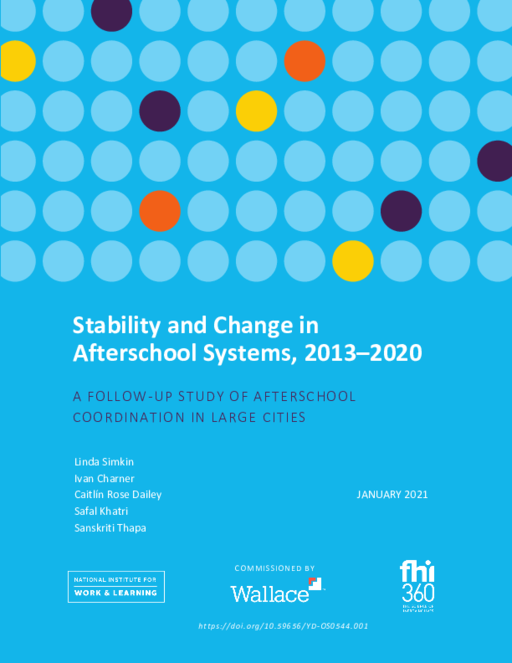- Author(s)
- Linda Simkin, Ivan Charner, Caitlin Rose Dailey, and Safal Khatri
- Publisher(s)
- National Institute for Work and Learning
Research Approach
FHI 360 researchers drew on 75 of the 77 cities they had examined in 2013 to carry out a 2020 follow-up study, which was conducted entirely by survey. In 2020, the researchers identified knowledgeable contacts in 67 of the communities. Screening questions then determined which respondents took the survey, which consisted of both fixed-response and open-ended questions. Survey responses were entered into the study’s SurveyMonkey database and analyzed.
Because data collection ended immediately before the Covid-19 pandemic radically changed the afterschool landscape, findings reflect a time before schools and afterschool programs closed or were reconfigured. Nevertheless, the findings in this report provide insights into factors that affect coordination.
Samples. The sustainability study sample consisted of 75 cities identified as having had afterschool coordination in 2013. (Two of the original 77 cities were left out for methodological reasons.) Research staff identified knowledgeable contacts in 67 of these cities. The 10 cities that reported having no afterschool coordination were ineligible to participate in the survey. Nonetheless, knowledgeable contacts in these cities provided information about the history and cessation of afterschool coordination in their cities during screening question phone conversations. Researchers also examined these cities’ responses to the 2013 survey.
The adoption study population consisted of 50 cities, including 23 screened for the 2013 study that were not coordinating at that time according to knowledgeable respondents, and 27 where a knowledgeable contact could not be identified despite outreach to a variety of people usually involved in afterschool provision or coordination. Knowledgeable contacts were found in 34 of the 50 cities.
Respondents. The study designated one respondent per city to participate, i.e., the person who self-identified as most knowledgeable about whether any efforts were currently underway to coordinate afterschool programs in their cities. Multiple methods were used to find these individuals.
Survey Instruments. An online survey hosted on SurveyMonkey.com was used to collect all 2020 data. In 2013, most surveys were collected online but researchers conducted phone interviews with some respondents who preferred this method. Survey responses were then entered into the study’s SurveyMonkey database. The survey instruments for the sustainability and adoption studies contained 36 questions each in fixed-response and open-ended formats.
The 2020 surveys contained many of the same questions as the 2013 survey so that comparable data could be collected. They also contained new items asking about supports that could facilitate system-building efforts.

